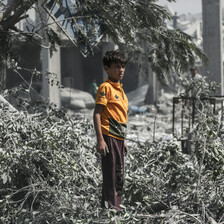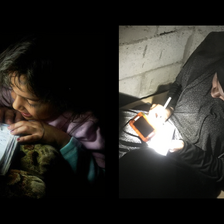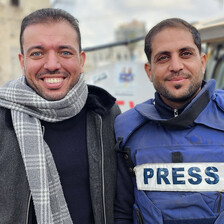The Electronic Intifada 16 July 2025

A displaced family living in al-Mawasi relies on seawater to wash dishes and bathe, 13 July.
ActiveStillsOf the many means of collective punishment used by Israel against Gaza’s more than 2 million people, the fuel blockade is one of the most devastating yet least understood.
I write these words as a municipal engineer in Gaza and as someone living through the genocide and seeing its impact first-hand.
Fuel is the invisible force that keeps life running in Gaza – especially after Israel cut off the supply of electricity in October 2023. Without it, water is not pumped. Sewage is not treated. Bread is not baked. Hospitals cannot operate ventilators or sterilize equipment. Garbage piles up on every street corner. Telecommunications are unstable.
The absence of fuel is more than an inconvenience; it is an engineered collapse of every system that sustains life.
Prior to the ongoing war – as a result of Israel’s siege imposed in 2007 – Gaza’s municipal services relied on electricity that was available for only limited hours each day and daily deliveries of fuel to power generators at wells and wastewater treatment plants.
During the past 21 months of Israeli aggression, 75 percent of Gaza City’s wells were destroyed by Israel while the remaining wells have stopped or are partially operating for limited hours that are insufficient to meet the needs of the population.
In some neighborhoods, residents go days without access to clean water. Desperate families collect water from agricultural wells or polluted rainwater runoff. Children bathe in contaminated water, leaving them vulnerable to skin diseases and bacterial infections. Sewage floods streets, seeps into homes, tents and makeshift shelter areas for displaced people, or drains into the sea.
Most water pumps have shut down because of the lack of diesel. Due to the collapse of the wastewater system, several large stormwater retention basins have become filled with raw sewage. The pumping stations connected to these basins do not have fuel to move the wastewater out to sea, leading to rising sewage levels and the threat of overflow into nearby displacement shelters.
Staggering toll
The lack of fuel also hinders people’s ability to access food in Gaza, where acute malnutrition among children is skyrocketing.
Without electricity, fuel, gas and other supplies for ovens or transport, most bakeries have closed. In lieu of cooking with ovens, stovetops and microwaves, families now use wood, plastic or even sponges to fuel cooking fires. I’ve seen people burn furniture, books and clothes.
It’s a brutal paradox: Gaza is burning the remnants of its past just to survive the present.
The environmental toll of this desperation is staggering. Burning plastic, synthetic fabrics and treated wood releases toxic fumes that pollute the air, increase respiratory illnesses and create long-term health hazards – especially for children and the elderly.
The United Nations says that “fuel is the backbone of survival in Gaza” and once it runs out, it will bring all humanitarian operations to a halt.
The availability of fuel is a matter of life or death in Gaza’s hospitals. Without electricity, generators powered by fuel are the only way to keep intensive care units, neonatal incubators, dialysis machines and surgical equipment running and functioning.
Health officials in Gaza have warned that the fuel that keeps the hospital lights on is about to run out, risking an abrupt shutoff of machines that would mean “inevitable death” for many patients.
This insecurity is by design and Israel ensures that this disastrous crisis is chronic by permitting only very limited amounts of fuel from time to time, with no fuel entering Gaza for 130 days until a small amount was allowed in last week.
Already, dozens of medical facilities have reduced operations or shut down entirely. Ambulances are grounded. Sterile environments are compromised. Patients die not because their illness is untreatable, but because the treatment requires electricity and electricity requires fuel.
Collapse of essential services
As a municipal engineer, I see firsthand how the fuel blockade has paralyzed our ability to meet people’s basic needs. Without fuel for heavy vehicles, most solid waste now remains uncollected. Mountains of trash grow in every neighborhood, attracting pests and spreading disease.
We are watching the environment degrade in real time, unable to intervene. Gaza is turning into an open-air dump.
Taxis are no longer available and public transportation has collapsed. Without fuel, cars and buses sit idle. Workers cannot reach their jobs, parents are forced to abandon all their possessions when evacuation orders strike and families are cut off from one another, even in the event of a medical or emotional crisis. Gazans now typically go to hospital on foot or by using an animal-drawn cart.
The fuel blockade is not an unfortunate side effect of war. It is a deliberate Israeli policy designed to grind Gaza into submission. Fuel is about water, health, food and survival. Israel knows this. This is why it blocks fuel and targets solar panels. That is why it delays or destroys generators and fuel tankers meant for hospitals and bakeries or even water wells.
Israel’s goal is not only to kill but to unmake the possibility of life.
The fuel blockade is not just a technical issue; it is a humanitarian emergency and a war crime. It is one of the quietest, slowest and most suffocating ways to kill a people. We need people around the world to act – not just to restore fuel, but to restore the right of Palestinians in Gaza to live.
We need real and effective intervention so that sufficient quantities of fuel are allowed in and technicians can revive essential services and save what can still be salvaged.
We are demanding freedom. And in this moment, fuel is not just a resource; it is what we need to keep the flame of hope alive.
Asem Alnabih is an engineer and PhD researcher currently based in Gaza City. He serves as the spokesperson for Gaza Municipality and has written for many platforms in both Arabic and English.





